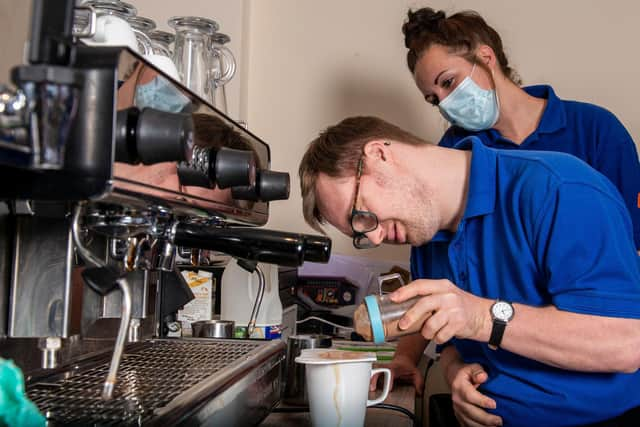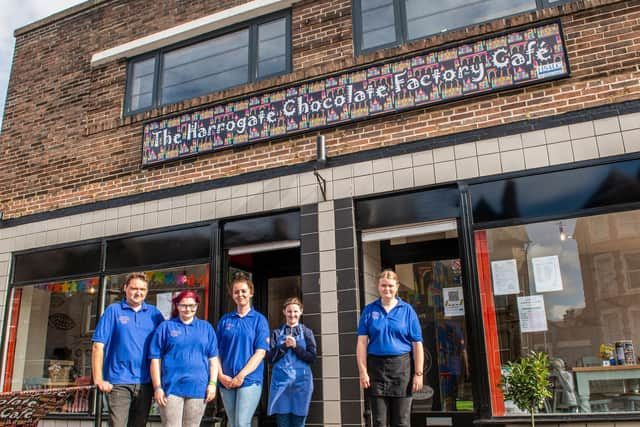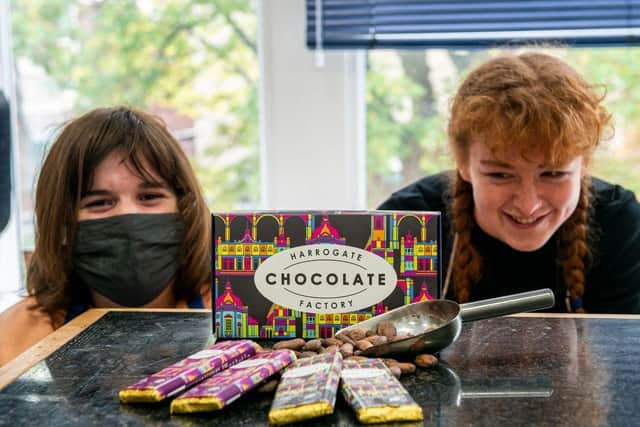How Harrogate Chocolate Factory is helping people with learning disabilities and autism get jobs
“Yorkshire is chocolate,” says Harrogate man Michael Horn.
The region’s not exactly shy of boasting about its achievements, but he’s got a point: nearby York is known for Rowntree’s, its former Terry’s factory and Nestlé has a base there too.
Now the Harrogate Chocolate Factory is getting in on the act – but it’s about so much more than the tasty treat itself.
Advertisement
Hide AdAdvertisement
Hide Ad

For two years its students, aged between 18 and 25, have been producing chocolate “from bean to bar” and, after opening its own factory when producing hampers last Christmas, for the last two months it has also run a cafe in the town centre.
Mr Horn, enterprise business manager with the Harrogate Skills 4 Living Centre (HS4LC) charity, says: “Two years ago when I met them, they wouldn’t have been able to cook themselves a meal, let alone make their own bed. And that’s the type of thing we teach alongside this, it’s that whole independent living ability to take care of themselves and ability to hold down a job and, for some of them, just to feel part of the community, to feel like they’re accepted.
“There’s a lot of stigma out there, that’s the thing that we’re kind of pushing back against.”


What sort of stigma?
“That they’re not capable, they’re a distraction, they should be kept out of sight, out of mind.”
Advertisement
Hide AdAdvertisement
Hide AdFor Mr Horn, it’s personal – his 10-year-old daughter, Erin, was born with Down’s syndrome and autism, so he wants to create a better society for when she grows up.
But the confectionary business all started when the charity’s “chocoholic” CEO, Hadyn Moorby-Davies, started looking into the process of how to create it.


“When he saw it he realised there was a step-by-step process that was very easy to break down,” says Mr Horn.
“He thought, with people with autism, that step-by-step and being able for it to flow from one to another, would give them an opportunity to learn different processes and gain skills whilst also learning things about food handling and hygiene and all sorts. It was his baby, really.
Advertisement
Hide AdAdvertisement
Hide Ad“And when you start making that amount of chocolate, what are you going to do with it? He can’t eat it all!”
It is an intensive process – Mr Horn estimates that it takes around 30 hours to create 40 bars of chocolate – and the charity has steadily taken more students on over the last couple of years to deal with increasing demand.
Last year the charity had nine students that graduated and this year has around 15. The aim is to have more than 20 students working in either the bakery, factory or cafe by next year, giving them an opportunity to try out both manufacturing and “customer-facing” jobs.
Some graduates are given paid employment at the charity on a sixth-month contract, during which they are supported to build up their CVs, get help with job applications and interview preparation, then once successfully employed the charity even offers continuing workplace support.
Advertisement
Hide AdAdvertisement
Hide AdA basement is being converted to house the enterprise’s bakery and chocolate manufacturing facility but Mr Horn thinks that it won’t be long before that is outgrown by demand. The “dream”, he says, is to have an off-site factory supplying all the products that are supplied in its East Parade cafe.
Confidence-building is a key part of what they do.
Mr Horn says: “I said to one of my guys the other day, they were feeling a bit down on themselves, I said: ‘That person over there, do they know how to produce a chocolate bar from scratch?’ They went: ‘No, they’ve never been in the factory, they don’t know what to do’. And I went: ‘Do you think that any person on the street knows how to do it?’ They went: ‘No’. I went: ‘You’re one of a very small, elite unit of people in the country who knows how to do this from scratch. That makes you amazing. You could teach somebody how to do this – you could teach somebody how to make chocolate. That is in itself an amazing skill and it’s uplifting and – some of them, anyway – feel really anxious and they feel nervous and they don’t feel like they’ve got any skills but they really, genuinely do.
“Our whole thing is inclusion and getting them out there and letting them experience as much of a life as what you and I probably take for granted sometimes.”
Laura Weldon, 20, formerly of Springwater School, started as a student at the charity last September, gaining experience in the factory and cafe, and has just been taken on for paid work.
Advertisement
Hide AdAdvertisement
Hide AdShe loves dealing with customers but has also recently moved into a new home.
Her colleagues are “friendly and funny”, she says.
Jade Lynskey, meanwhile, used to work at HS4LC’s Brackenley care home but made a move over to tutoring and has also been a staff member at the cafe for the last two months – a type of job she’s never had before, just like many of the students.
Miss Lynskey, 27, says: “You can look at a person and they come in and they might not speak and by the end of the shift you’ve managed to get them to speak, or they can’t make a cappuccino and by the end of the shift they’re able to make a cappuccino because you’ve been the one to do that. And I think that’s what’s rewarding is you’re providing them with that experience and they can then take that off and do it with different things.”
She likes that the charity is not just “cramming them with loads of information and a training programme and expecting them to learn it within two weeks. Here it’s just a great platform for them to start out,” she adds.
Advertisement
Hide AdAdvertisement
Hide Ad“You have that time to be able to teach them. For something like making a coffee, they might be expected in a usual workplace to learn that within two weeks or a month’s probationary. Whereas here, there’s no time limit.”
“I don’t feel like it’s work, as well, we’re all a big team.”
Mr Horn, 35, who has previously run coffee shops in Harrogate, concurs.
“Society has come a long way from where it was before.
“I can only say from my own background, I have a daughter that was born with Down’s syndrome and autistic and, when she was born, because we were young parents, we were pretty much told by the doctors that adoption is a possibility and we’re young enough to try for another child.
Advertisement
Hide AdAdvertisement
Hide Ad“I mean, imagine hearing that when you’ve just given birth.
“The idea that there is something out here, that when my daughter reaches this age, where she is taken care of in a safe environment but also taught, given opportunities...it’s a no-brainer for me.
"I want to be a part of that – I want to make sure this carries on and is still here when my own family are ready to need a service like this.”
